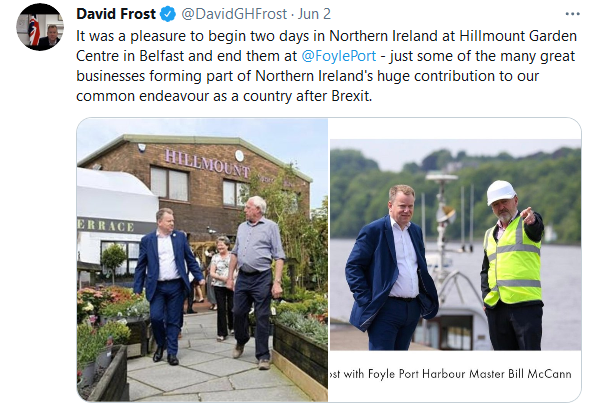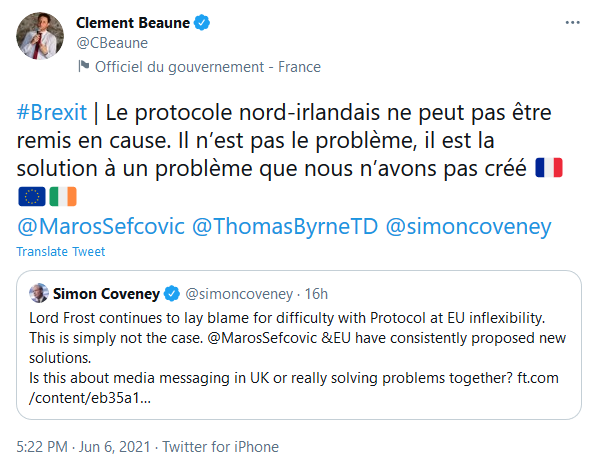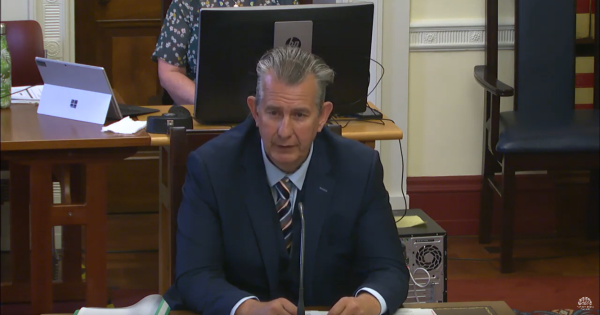Brexit & Beyond Newsletter
7 June 2021

Welcome to the 7 June newsletter
Ahead of meetings of the Joint Committee and Partnership Council (the bodies which oversee the EU-UK Brexit agreements, including the Protocol on Ireland/Northern Ireland), tangible progress on outstanding Protocol issues is apparently limited. Lord David Frost, who is responsible for the UK’s relationship with the EU, was in Northern Ireland last week to meet with stakeholders. Minister for Agriculture Edwin Poots appeared before the NI Assembly Agriculture Committee on Thursday. Poots has also announced a delay to the implementation of checks on pet travel at NI ports.
Protocol discussions continue
The EU-UK Joint Committee is meeting on Wednesday (9 June). The Committee is responsible for the implementation and application of the Protocol on Ireland/Northern Ireland. NI Executive Ministers attend the meetings when NI issues are on the agenda and when Irish Ministers are present as part of the EU delegation. Last week Secretary of State for Northern Ireland Brandon Lewis and UK Brexit Minister Lord Frost were in Northern Ireland to engage with businesses and other stakeholders on the Protocol.

Lord Frost visited Northern Ireland last week to engage with businesses | Source: Twitter
Writing in the Belfast Telegraph, Frost and Lewis state, “The Protocol ultimately depends on the consent of the people of Northern Ireland. Its explicit purpose is to support the peace process and the Belfast (Good Friday) Agreement. It is with that overarching goal of stability in mind that the rules must be applied.” They urge the EU to “embrace a common sense approach, focused on genuine problems, not on mitigating against risks that don’t exist.”
Writing in the Financial Times yesterday (Sunday), Frost accused the EU of “legal purism”. He argues that the UK is implementing the Protocol and writes that “we underestimated the effect of the protocol on goods movements to Northern Ireland, with some suppliers in Great Britain simply not sending their products because of the time-consuming paperwork required”.
Frost states that the UK Government is working to resolve the problems consensually: “We have sent a range of policy papers to the EU to outline solutions. Just last week, we sent a detailed proposal for a veterinary agreement based on equivalence and for an authorised trader scheme to reduce paperwork and checks. But we have had very little back.” Irish Foreign Minister Simon Coveney tweeted in response to Frost’s article that the EU has “consistently proposed new solutions”.
Coveney met with Frost in London on Friday. Ahead of the meeting, he outlined concern among EU member states: “This is an EU issue where more and more EU countries are asking the hard questions. We signed up to an agreement. It’s not being implemented. Why not? And what are the consequences of that? …Before this issue becomes a more controversial issue politically between the UK and the EU, we really have to try to secure some of the compromises and flexibilities and pragmatism that has been asked for to actually make this protocol work in a way that the vast majority of people in Northern Ireland can, I hope, accept”. France’s Europe Minister Clement Beaune tweeted that the Protocol “cannot be called into question…it’s the solution to a problem which we didn’t create”.

French and Irish Ministers respond to Lord Frost’s article on the Protocol | Source: Twitter
Following the upcoming meeting of the Joint Committee on Wednesday, the G7 will be hosted by Prime Minister Boris Johnson in Cornwall on 11-13 June. While Brexit is not formally on the agenda, there is an expectation that US President Joe Biden will use the opportunity to pressure Johnson not to renege on his commitments under the Protocol, and to warn that the prospects of a US-UK trade deal will be diminished if the situation is not resolved. One journalist reports that there is a “strong consensus” across the EU that Frost is the problem and that the EU strategy is to “isolate him and use margins of the G7 to get to Boris Johnson directly”.
The Partnership Council, which oversees the EU-UK Trade and Cooperation Agreement, is also meeting on Wednesday in London. This will be the first meeting of the Council which, like the Joint Committee, is co-chaired by David Frost and Vice-President of the European Commission Maroš Šefčovič. Lord Frost recently confirmed that where matters under devolved competence are on the agenda of the Partnership Council, they expect to facilitate the attendance of the devolved administrations. He invited First Minister Arlene Foster and deputy First Minister Michelle O’Neill to meet with him ahead of the Partnership Council.
EU outreach
Maroš Šefčovič met with local parties in Northern Ireland last week to discuss the Protocol. Alliance Party leader Naomi Long and MP Stephen Farry met virtually with the EU Vice-President last week: the politicians emphasised to Šefčovič their support for an EU-UK veterinary agreement. Šefčovič also met with the SDLP: Claire Hanna MP stated the meeting was “focusing on clear and available solutions and realising new opportunities”, such a Swiss-style deal on SPS arrangements which would remove around 80% of checks. On local media this morning UUP leader Doug Beattie indicated he was also meeting with Šefčovič.
Poots delays checks on pets
On Tuesday Minister for Agriculture, Environment and Rural Affairs announced he would delay the introduction of checks on pets at NI ports until at least 1 October 2021. Poots said, “This is to allow a further period for the ongoing UKG/EU discussions, where pet travel is under consideration, to provide direction on both the requirements necessary and any potential flexibilities.” He said the delay would allow pet owners to prepare for the new regulations for pet travel and allow the Department to review the potential requirements and educate the public further. Poots says he has written to the EU to highlight that these requirements for pet travel “are not necessary”. According to his statement, “urgent consideration is being given to the potential for a Common Travel Area between GB, NI and ROI” and a joint working group has been meeting to consider flexibilities.
Poots gives evidence to Assembly’s Agriculture Committee
On Thursday, Minister Poots appeared before the Committee for Agriculture, Environment and Rural Affairs, as part of its inquiry into the withdrawal of DAERA and Local Authority staff from ports. Poots outlined the factors leading to his decision, including threatening graffiti, concerns from local government, and PSNI evidence to the Northern Ireland Affairs Committee. Poots said a whole series of events “led us to the conclusion we could not guarantee our staff’s wellbeing.” He asked the Committee what it would do if it were in this position. Philip McGuigan (Sinn Féin) said he suspected that “most people would expect the viewpoint of the PSNI to be paramount and their assessment was low [regarding the threat]”. Poots said he viewed the inquiry as “politically motivated and politically driven”. Chair of the Committee Declan McAleer (Sinn Féin) said the decision of the Minister was “at odds with what we were told by the PSNI”.

Minister Poots addressing the Committee for Agriculture, Environment and Rural Affairs | Source: NI Assembly
Protocol
Poots was also asked about plans to ensure there are suitable staff numbers in place at ports. He said the EU needs to “recognise that what they’re asking of us is not deliverable”, noting the shortage of vets. He said there is “no logic” for guide dogs to have a rabies vaccine, or medical procedures on dogs for tapeworm when these diseases haven’t existed in these islands for many years. He added that there is “no logic” for 15,000 checks per week on food which is the same standard of that of the EU, and which is not entering the EU.
North-South cooperation
Poots was asked about his attendance at North-South Ministerial Council meetings. In the context of Brexit, the North-South Ministerial Council is one of the bodies which feeds into the Specialised Committee on the Protocol. Poots denied that he had refused to attend North-South meetings. He said that there shouldn’t be barriers on island of Ireland, that the single market should be protected, and that there shouldn’t be barriers in the internal market. He argued, “I don’t see any reason why we [the Executive] can’t agree all three of those things, because that properly protects the Belfast Agreement” – both the North-South and East-West aspects.
Meeting with the Taoiseach
Later on Thursday Poots travelled to Dublin to meet with Taoiseach Micheál Martin. Poots described the meeting as “positive, frank and useful”. He also confirmed that he would attend the upcoming meeting of the North-South Ministerial Council on 18 June. In a statement, the Taoiseach said there was an “open exchange of views” and pointed to a temporary veterinary agreement between the EU and the UK as an obvious way to resolving problems around the Protocol.
Post-Brexit divergence and the UK internal market
The Tony Blair Institute for Global Change has published a paper considering UK regulatory policy post-Brexit. The paper notes that “the UK needs to recognise the reality in which EU law will still affect the UK after Brexit. Rather than denying it, it should proactively engage with regulatory changes on the EU side.” It notes that UK divergence from EU rules will mean new economic friction for Northern Ireland with the rest of the UK, noting, “in some areas, the UK may wish to voluntarily follow changes in EU law to prevent friction with Northern Ireland. The UK needs a clear strategy for addressing future regulatory changes in EU law”.
On the same subject, the Institute for Government has also published a paper entitled “Taking back control of regulation”. It argues that there are solid reasons why the UK Government may want to do things differently to the EU in terms of regulation. However, “the government should avoid divergence for its own sake and instead weigh up – and be clear on the costs as well as the benefits of its approach.” The paper notes that “any additional regulatory changes that may deepen the trade barriers between Great Britain and Northern Ireland could fuel further political tensions if not managed well.”
The Competition and Markets Authority (CMA) has opened a consultation on draft guidance on the role of the Office for the Internal Market (OIM) which was created by the UK Internal Market Act to independently monitor the operation of the UK internal market, following the return of powers to UK and devolved governments which were previously under EU competence. The consultation closes on 23 July 2021.
Other news
- The UK Government has appointed a Northern Ireland Special Envoy to the US. Trevor Ringland MBE will be responsible for promoting local interests in the US, driving inward investment and strengthening ties between the US and Northern Ireland. Ringland is a former member of the UUP and later joined the Conservatives, becoming the party’s vice-chair in Northern Ireland.
- The Department for Economy’s ‘Trade and Investment for a 10x Economy’ strategy points to work with Invest NI and external foreign direct investment (FDI) specialists to “identify potential FDI implications (opportunities & challenges) of our new trading arrangements, including the potential attractiveness of GB & EU dual market access to investors.”
- The UK and EU has reached an agreement in principle on fishing opportunities for the remainder of 2021, including allowable catches for fish stocks and access limits for non-quota species. This is the first agreement on fisheries between the parties under the EU-UK Trade and Cooperation Agreement.
- The UK has agreed in principle a new trade deal with Norway, Iceland and Liechtenstein. According to the UK Government, it is “the most advanced free trade deal signed by the three countries to date”.
This Week at the Assembly
- Monday 7 June, 2pm - Plenary - Question Time: Economy
- Tuesday 8 June, 2pm - Plenary - Question Time: Finance
- Thursday 10 June, 9.35am - Committee for Health - EU Exit legislation
- Thursday 10 June, 11 am - Committee for Justice - EU Exit legislation
Catch up with the Committees
- Tuesday 1 June, 2pm – Plenary - Question Time – The Executive Office
- Wednesday 2 June, 2.35pm - Committee on Procedures - House of Commons Procedure Committee Inquiry - Briefing by RaISe
- Thursday 3 June, 9.35am – Committee for Agriculture, Environment and Rural Affairs - Oral Evidence from DAERA Minister Poots - Withdrawal of DAERA and Local Authority staff from ports



